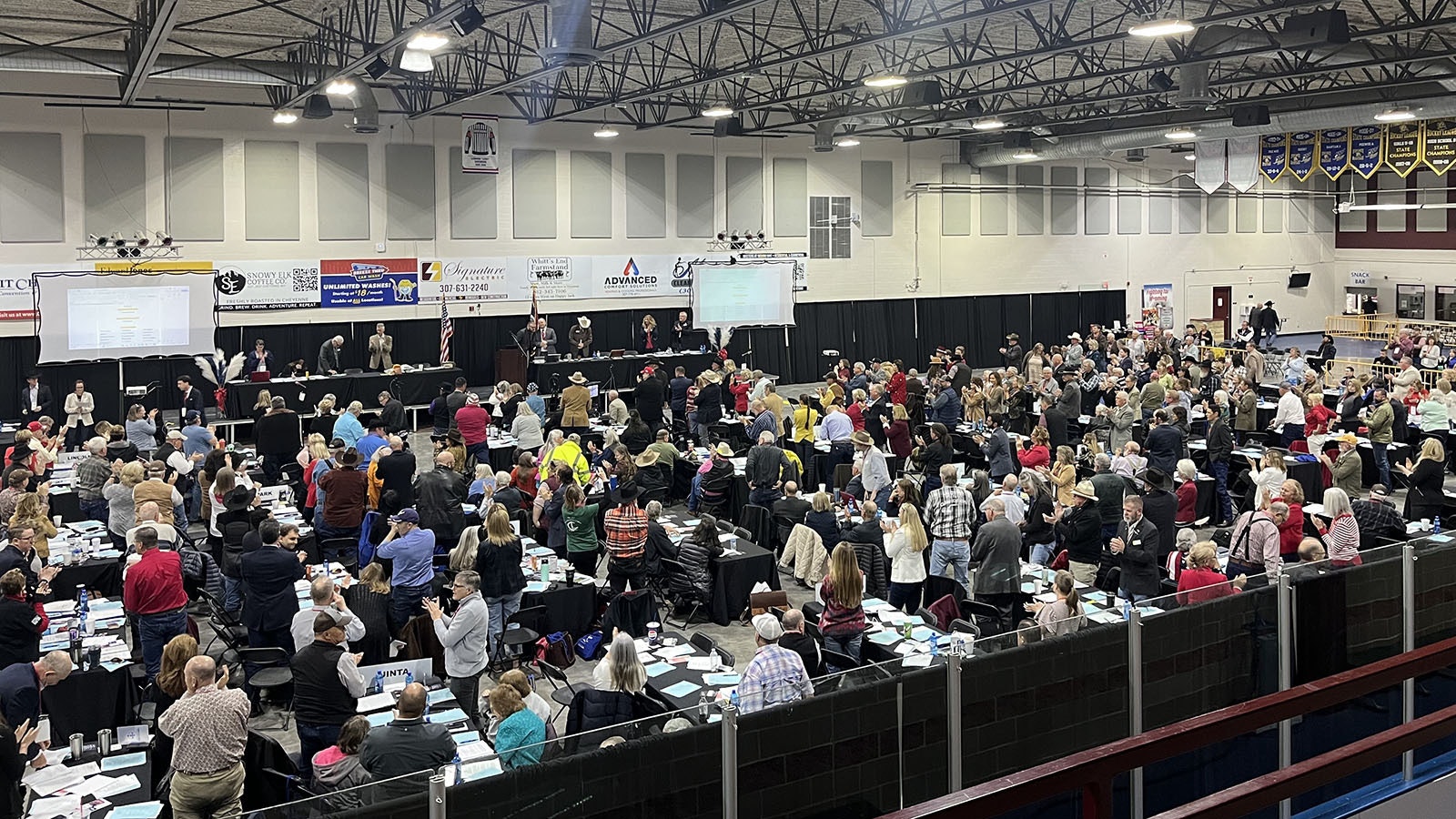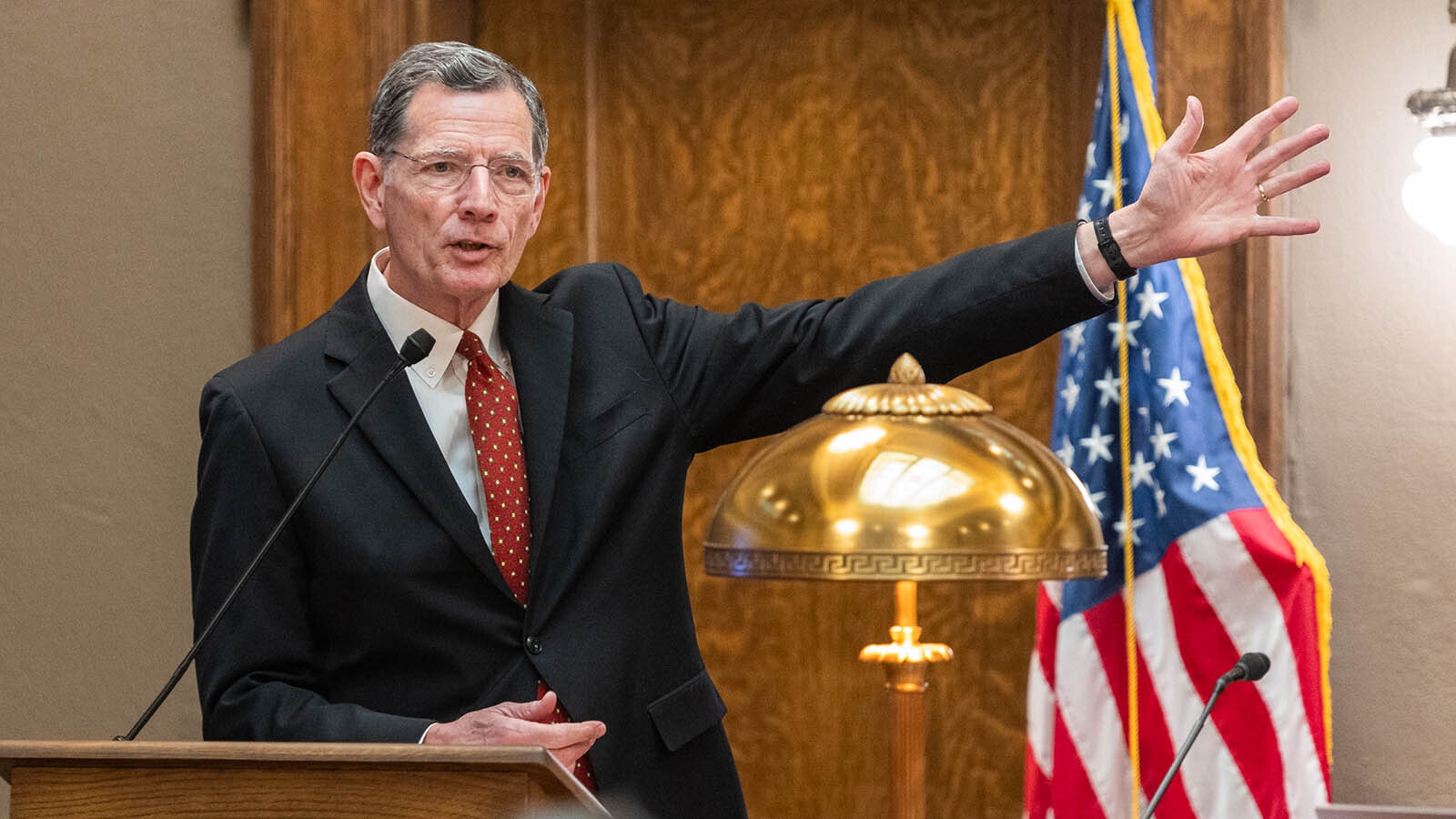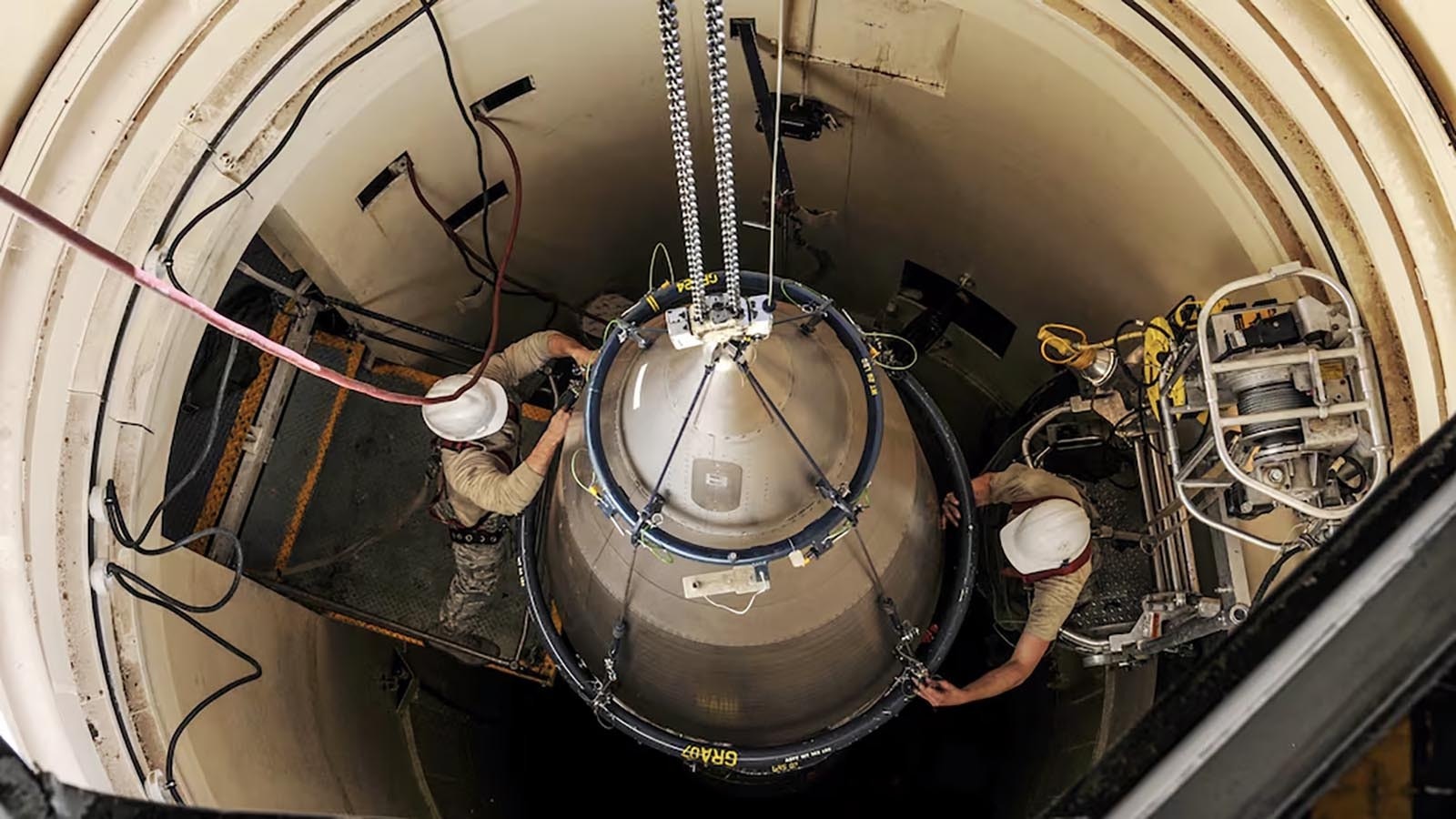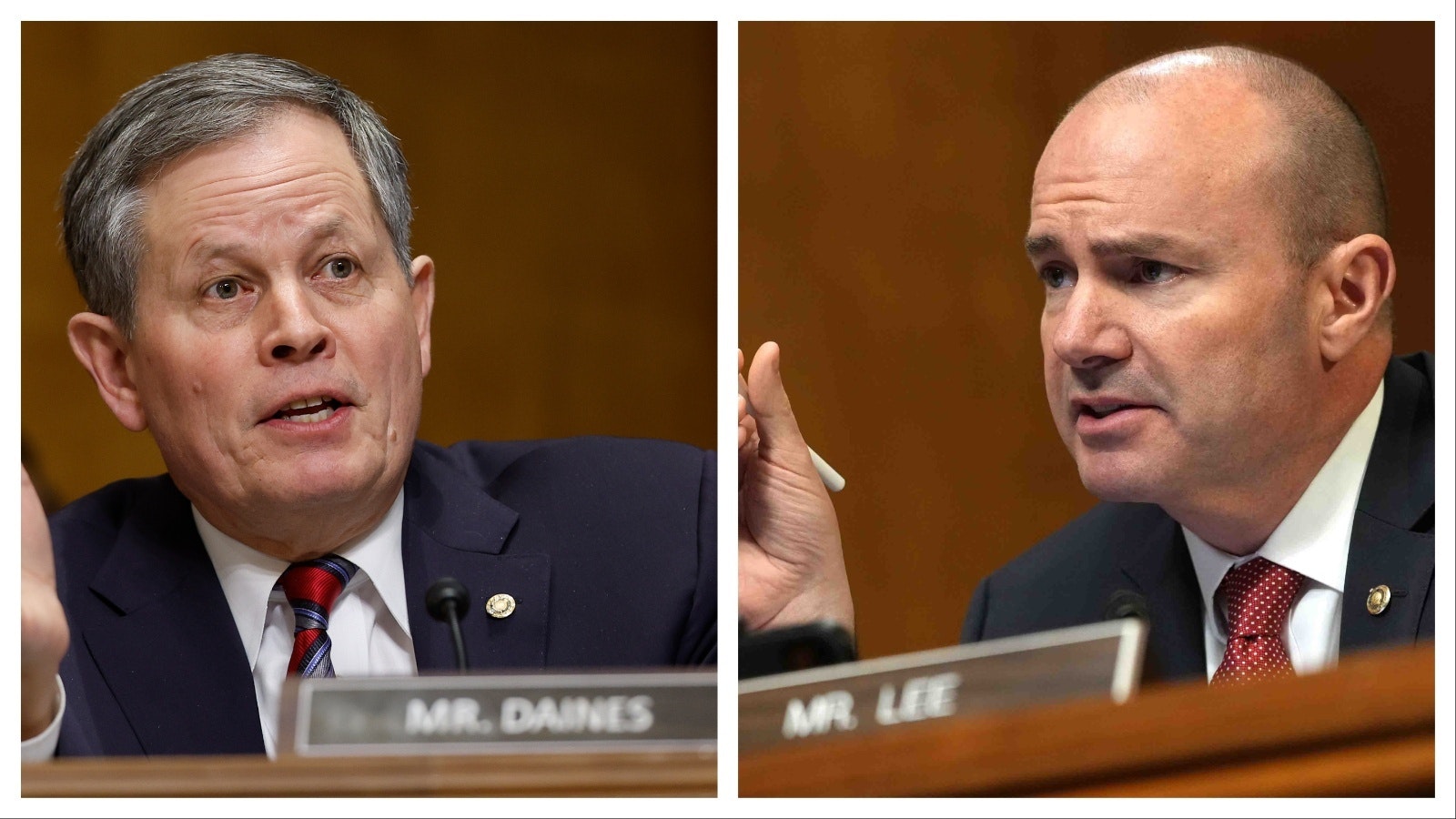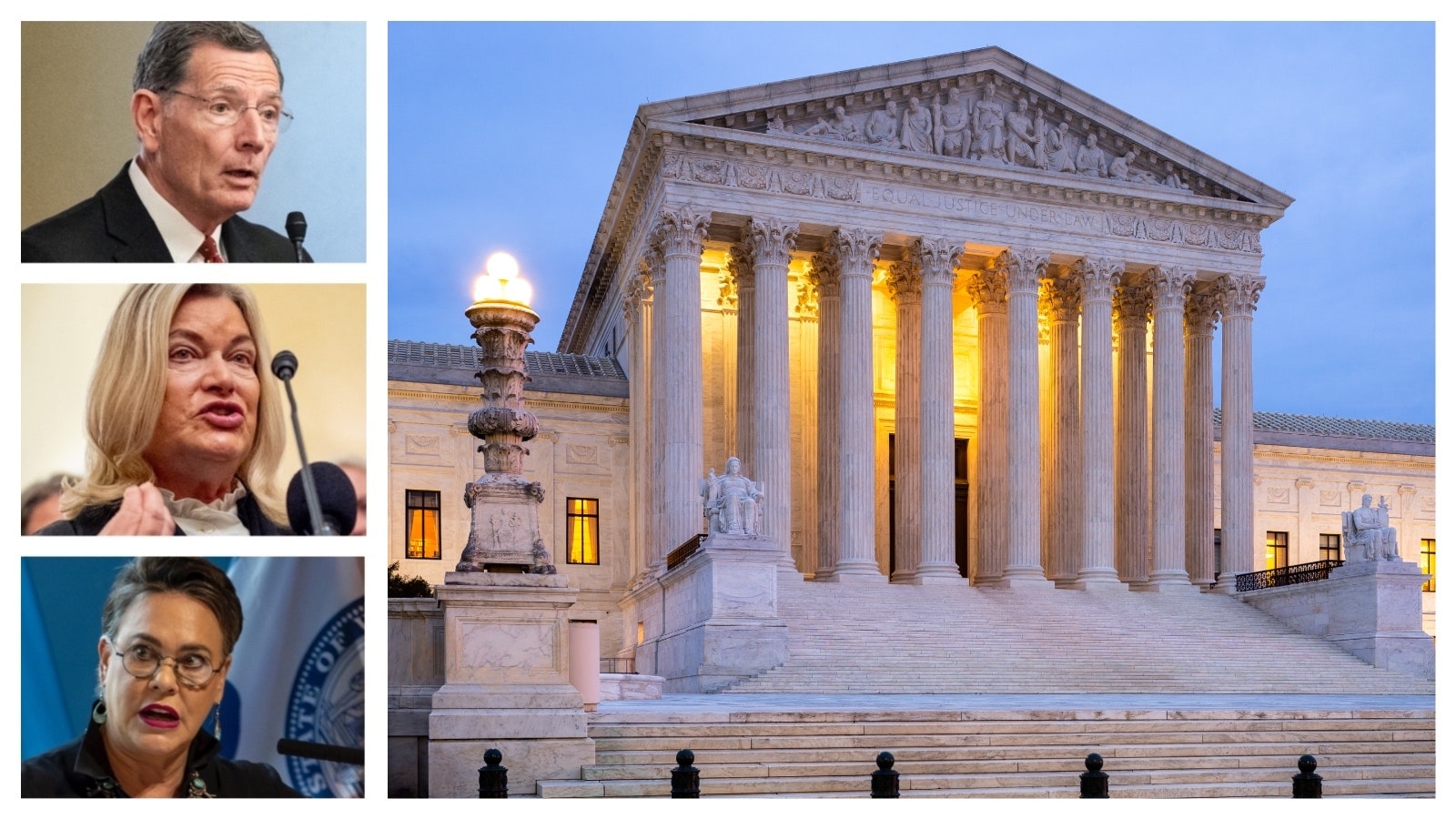One of the widest divisions within the Wyoming Republican Party has been a debate between “big tent” and “small tent” ideologies, referring to how strict the party should be with its membership.
Some like Sweetwater County GOP Chairman Elizabeth Bingham believe the small tent approach has resulted in a smaller turnout for state GOP conventions like the one that wrapped up Saturday in Cheyenne.
The big tent approach represents a belief that all who say they are Republicans should be welcomed into the party and allowed to vote without criticism as to what they believe is right based on their interpretation of the party’s platform. The small tent approach asserts that members should be held to a strict adherence to the party’s interpretation of its platform in order to be considered Republicans.
The larger population counties in Wyoming like Natrona, Laramie and Sweetwater tend to be more moderate politically and favorable to the big tent approach.
The farther right, small-tent camp has control over the party’s leadership and has continued to make moves further chipping away at what little control the big tent camp has left over the last few years. It’s done this to the representation of the Natrona County GOP, one of the more moderate Republican parties in the state, which has had all but three of its 36 delegates stripped for the last two state conventions because of a refusal to pay duties to the state party since 2019.
It’s difficult to prove whether Bingham is definitively correct, but Wyoming GOP Executive Director Kathy Russell admitted that turnout for state conventions hasn’t fully recovered since the COVID-19 pandemic. Russell, however, disagrees there’s any connection between the big tent-small tent feud when it comes to convention turnout.
“You look around the room, you’ve still got healthy debate going on,” she said. “Maybe a small delegation, but we’ve got different points of views represented, certainly.”
How It Works
Delegate representation at the convention is set by a proportional formula based on how many registered Republicans there are in each county.
Whether a convention is following a presidential election year also impacts how many delegates can attend, as more people tend to register and vote in those years. This year’s convention followed the non-presidential elections of 2022.
Party Chairman Frank Eathorne set the maximum number of delegates who could be called for this year’s convention at 350. This was much lower than prior conventions where as many as nearly 700 delegates were in attendance.
Also, a bylaw change made a few years back increased the minimum representation for each county from three to six delegates. Raising the base number that can be called and lowering the max number is a move that provides a small benefit to the smaller population counties and small weakening to the representational power of bigger counties.
For example, in Lincoln County, each delegate would have represented as many as 507 registered Republicans. In Laramie County, each delegate would have represented no more than 703. Some of the state’s smallest counties came in at around 300-350.
Generally, a delegate representing fewer people is more directly representative of those people.
“The fewer you can represent the better,” Bingham said.
But Park County GOP Committeeman Vince Vanata, who has been serving as a delegate at party conventions since 2014, noted that he has never seen the party reach its maximum number of delegate allotments.
“All in all, everyone gets to vote,” he said.
On Saturday, only 314 delegates participated, and there wasn’t much free space left on the Cheyenne Ice Center floor for more people to attend. Calling for too many delegates, Vanata argued, could result in the party wasting money, time and other resources on people who don’t show up.
Vanata and Wyoming GOP Vice Chair David Holland believe where a convention is held significantly affects turnout and the perception around it. For instance, the 2022 convention was held at a somewhat smaller venue.
“It was a bigger venue (this year) so it seems like it was less people, (but) numerically it’s about the same,” Vanata said.
Vanata also referenced a convention that was held about 16-18 years ago in Cody. That event, which he said was full, was held at the 1,000-person capacity Wynona Thompson Auditorium.
Is More People Better?
Holland attended his first state convention in 1984. Inspired and excited by the pro-life abortion stance held by former President Ronald Reagan at the time, Holland and his wife hoped to bring a pro-life platform to the Wyoming GOP at the ’84 convention.
He said they were thoroughly dismissed by the party’s leadership at the event, which left them feeling “so empty” and “silenced.”
“We got shut down on every corner,” he said. “We were not allowed to talk, we were completely shut down.”
Holland believes the party’s leadership does espouse a big tent philosophy, welcoming as many people as possible, so long as they agree to the party’s platform, which he believes all Republican candidates should strictly adhere to.
“I support the big tent,” he said. “I support the debate as long as it's in the arena of ideas and opinions are allowed to be discussed. I believe it helps the party and anything that limits that will damage the party.”
Sweetwater County GOP state committeewoman and former county party chair Teresa Richards believes a stringent loyalty is expected from the Wyoming GOP. Anything less and someone is considered a Democrat.
“If you are not with the other side 100%, you’re out,” she said.
Bingham said the same applies for supporters of the big tent approach.
“And the smaller the tent, the less people that show up, which is why you have to call a smaller delegation,” she said.
Unification
Rhetoric from the state party leadership and those aligned with its political views have criticized some Republican lawmakers for their political views and accused them of not being real Republicans, a position that was vocalized many times throughout the convention.
But there were also some promising signs of unity returning to the party at the convention. An effort to challenge the seating of delegates from Uinta County was defeated by a large margin and a bylaws proposal that would have allowed the party to kick out members it didn’t like was also soundly defeated.
“All in all it’s been civil,” Vanata said. “People are sharing a common burden of being impacted financially by the direction and line this country is taking. The Republican Party is becoming more united because our people believe in the need to bring a change.”
Russell agreed and said party members have been doing a better job of focusing on the issues rather than making personal attacks against each other.
Saturday’s convention was the first for Hot Springs County GOP delegate and county commissioner Phillip Scheel, who has a more pessimistic outlook. Scheel said he got involved with the party to try and heal some of the division he saw playing out within it. After seeing Gov. Mark Gordon censured by the party, he told Cowboy State Daily he believes the party has a long way to go.
“In my opinion, it shows how the legislation the party is passing is getting more divisive, it’s not getting better,” he said. “I think we’re a long way from getting that done.”
Mind Your Own Backyard
Richards said people around the state need to mind their own business and focus on their own local politics rather than attacking other lawmakers in different parts of the state. She wants the state party to be more accepting of the fact that the average resident in Sweetwater or Laramie counties may have a different opinion of what it means to be a Republican than in Weston or Platte counties.
“In my opinion, they’re pushing against constitutional representation, and only for party loyalty,” Bingham said.
Laramie County GOP delegate and county commissioner candidate Kathy Scigliano sees it differently and believes that people and voters who align with the Democratic Party platform should identify as such. She believes if the Democratic Party had a larger presence in Wyoming, more people would feel comfortable aligning with it and publicly supporting that party.
“What’s the point of having a platform if we’re not adhering to that?” she questioned. “If more of your views align with a different party, how about just be honest and say that you’ve aligned with that party?”
Money Talks
Getting more people involved in a political party usually translates to more money for that party. At an event like a convention, where participants must pay a registration fee, there’s a direct correlation between turnout and the money earned.
But Russell said the party doesn’t need to be completely dependent on soliciting money. Rather than rely on mega donors, the most valued currency in her mind is volunteer time. When people tell her they can’t afford to donate, she offers up opportunities for them to lend a hand physically.
“This is one reason why we have such a strong group is because we don’t rely on the biggest donors,” she said. “We look at volunteer time.”
Bingham said the same traditional donors are still getting involved in politics, but instead of giving to the state or county parties as they had before, they are now giving more to political action committees or directly to candidates. She said she’s constantly fighting a battle when trying to recruit new members or fundraise for her local party that the Sweetwater GOP is not the state GOP.
“They will not directly donate in that back account because they don’t want any of that money going to the state,” she said.
In effect, she believes this weakens the power and impact of the state and county parties as a whole and the party’s sway with the state Legislature. There were far more state legislators on hand from the farther right faction of the Republican Party than the rest of the party throughout the convention.
“The majority of Republicans are picking whom they like, and it’s not because they’re uneducated, it’s because of who they want to represent them,” Bingham said.
Why Money Matters
When a political party has more money, it usually means it has more money to give to political candidates.
Overall, state party fundraising has declined in recent years.
Party funding has taken a precipitous decline in recent years, according to state campaign finance records. In December 2015, the party had $90,489 in the bank. After reaching $175,709 in December 2018, that total declined in the years following to $69,085 by December 2022.
The Wyoming GOP only gave $16,500 to candidates statewide during the 2022 election cycle, despite $50,000 being originally budgeted.
Richards said there may be a time in the future when county parties decide to stop paying dues to the state party because they don’t feel that the state party is effectively supporting their local candidates.
“We’d have $7,000 extra to get our candidates elected,” she said.
Other Reasons Why Lower
There were a few other likely reasons why turnout was a bit lower this past weekend than in the past.
The party held its convention about three weeks earlier than in 2022 as a result of a very narrow window provided by the Republican National Committee. The chilly spring weather also didn’t do any favors, with freezing temperatures, snow and cloudy skies overhead all week, making travel less ideal.
Not a single member of Wyoming’s congressional delegation made the convention, but that was because Congress was still in session and making critical votes throughout the weekend. Also absent was Gordon, who said before the convention that he had prior engagements but has fallen out of favor with the party’s leadership particularly over the last year.
“Why do you want to come to something where you’re just completely insulted?” questioned Bingham, who opposed the censure.
Also, the event was held right in the middle of calving season, a major event for Wyoming’s many ranching families. This was the reason given by House Speaker Albert Sommers, R-Pinedale, for not attending.
Leo Wolfson can be reached at leo@cowboystatedaily.com.

